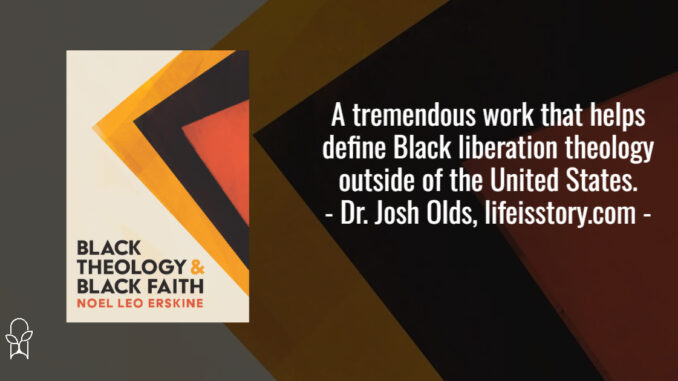
Published by Eerdmans on November 2, 2023
Genres: Academic, Non-Fiction, Racial Reconciliation
Buy on Amazon
Goodreads

Become Black with the oppressed Christ.
Contemporary Black theology is complex and far-reaching. In this concise yet thorough volume, Noel Leo Erskine examines Black theology from every angle, seeking to answer the question, Why would Africa’s children turn to the God of their oppressors for liberation?Beginning with the Middle Passage, which brought millions of Africans into the Caribbean and United States, Erskine unpacks the background and distinctive ideas of Black theology. Erskine covers major thinkers and illumines various areas of inquiry: suffering and theodicy, sin and reconciliation, baptism and the sacraments, womanism and Christology, and others. What unites these strands is the goal of liberation—of a faith that delivers not theoretical orthodoxies but real change in the lives of those buckling under racist oppression.
Black Theology and Black Faith is the perfect reading for students and scholars looking to recenter the voices of the marginalized in their theology. Readers will leave its pages with a faith more alive to God’s call to institute his kingdom on Earth.
Why would Africa’s children turn to the God of their oppressors for liberation? In Black Theology and Black Faith, Dr. Noel Leo Erskine—professor of theology and ethics at Candler School of Theology—outlines the historic development of Black Christian theology and its focus on social and spiritual liberation. Beginning with formative experiences of suffering in slavery, Erskine shows how Black faith developed through suffering, a suffering that continues today be it through the New Jim Crow, police violence, economic inequalities, or racist ideologies.
The opening chapter develops the social context of Black theology, highlighting the multiple types of oppression experienced—both historically and in the present-day—by those who are designated Black. Erskine is able to break fresh ground, rather than rehashing the same information told in any number of books on racial justice, by focusing on the Black Caribbean experience rather than being U.S.-centric. That focus is because Erskine is himself from the Caribbean, Jamaica in particular, and knows from lived experience that the historical background of Black Caribbean peoples is different than those of Black Americans. In particular, he dives into works of Rastifarianism and Bob Marley to discuss the development of a Black Caribbean theology.
As Erskine continues his narrative, he moves more or less chronologically forward while remaining topically-focused. One of his focuses is on how the missionary movement served (serves?) as a tool of colonization and was not interested in the liberation of oppressive structures. The gospel of the missionaries offered salvation in the future but damnation in the present; Black theology grasped inaugurated eschatology—that the gospel requires the demolition of oppressive empire.
About halfway through Black Theology and Black Faith, Erskine moves from being narrative-driven to focus very narrowly on not just certain theological topics but the writings and teachings of specific theologians (with chapter five being a series of essays reflecting on the writing of different Black womanist theologians). I won’t say that the Erskine lost the plot, but it’s an interesting switch in the middle of a book and leaves the whole of the book feeling disjointed. The content is solid, but feels limiting. If you read the book’s preface, you can see that Erskine’s intention was for every chapter to be a reflection on the writings of specific scholars, but while the first half of the book felt like it incorporated that conversation into the larger context, the last half of the book was not quite as successful.
But structural criticisms aside, Black Theology and Black Faith is a tremendous work that helps define Black liberation theology in a way that is not confined to within the continental United States. Erskine preaches a decolonizing theology that makes the case that the Christian God isn’t the “white man’s religion,” but that the Jesus who is God is—to follow in the footsteps of Erskine’s mentor James Cone—one who is themselves Black.
